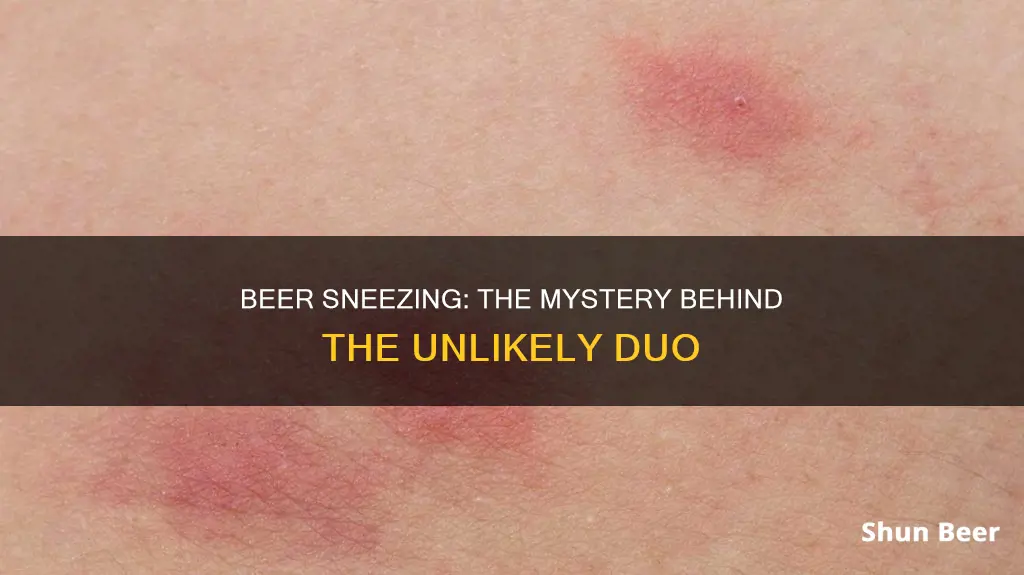
Sneezing after drinking beer can be caused by a variety of factors, including alcohol intolerance, allergies, or sensitivity to specific ingredients in beer. Alcohol intolerance is a genetic condition where the body struggles to break down alcohol efficiently, leading to symptoms such as a stuffy or runny nose. Allergies to ingredients in beer, such as grains, preservatives, or histamines, can also trigger allergic reactions, including sneezing. Additionally, sensitivity to specific ingredients in beer, such as wheat or barley, may be the culprit. Understanding the underlying cause of sneezing after drinking beer can help individuals manage their symptoms effectively.
| Characteristics | Values |
|---|---|
| Cause of sneezing | Histamine, a compound that elicits an allergic response |
| Cause of congestion | Histamine |
| Cause of congestion | Sulfites, typically highest in beer |
| Cause of congestion | Lower levels of enzymes needed to break down alcohol |
What You'll Learn

Histamines in beer
Histamines are chemicals produced by the human immune system and are found in nearly all tissues of the body. They are responsible for several functions, including sending messages to the brain, releasing stomach acid for digestion, and helping the body get rid of something that is bothersome, such as an allergy or injury. While the body naturally produces histamine, we also consume it through food and drinks that are rich in histamines, including cheese, wine, meats, fish, and fermented foods.
Histamine intolerance occurs when an individual has too much histamine in their body. It is not a sensitivity to histamine but rather an indication that the person has accumulated an excessive amount. Symptoms of histamine intolerance can include sneezing, hives, headaches, nausea, and digestive issues—similar to a common allergic response.
Beer and other fermented products contain histamine. A study assessed the histamine levels in 17 beers, and the results ranged from 21 to 305 micrograms per litre. Red wines generally have higher histamine content than white wines, with levels ranging from 60 to 3,800 micrograms per litre in reds and 3 to 120 micrograms per litre in whites.
Histamine intolerance can be managed by taking antihistamines, which help the body process the excess histamine. However, it is important to choose non-drowsy antihistamines, especially if planning to continue daily activities. Additionally, it is advisable to refrain from further alcohol consumption for the day to prevent exacerbating symptoms. Benadryl (diphenhydramine), a commonly used antihistamine, should be avoided due to its sedative effects, which can increase drowsiness and impair cognitive functions when combined with alcohol.
For those with histamine intolerance, it is crucial to be aware of how histamines in alcohol affect the body. This knowledge can guide individuals in making informed decisions about alcohol consumption, especially if they have experienced adverse reactions in the past. Consulting with a healthcare professional is recommended if one frequently encounters symptoms of histamine intolerance.
Myeloma Patients: Alcohol Intake, Beer or Wine?
You may want to see also

Alcohol intolerance
The symptoms of alcohol intolerance usually occur immediately after drinking alcohol and can be intense. One of the primary symptoms is facial flushing, where the face quickly turns red and may feel warm due to increased blood flow. Alcohol intolerance can also cause a rapid onset of a throbbing headache or migraine. Nausea and vomiting are common, with severe abdominal cramping and retching occurring soon after drinking. Additionally, individuals with alcohol intolerance may experience a rapid heartbeat, nasal stuffiness, and congestion.
The condition is caused by inheriting a gene that affects how alcohol is broken down by the body. The most common cause is ALDH2 deficiency, which results in decreased levels of aldehyde dehydrogenase, the enzyme responsible for breaking down acetaldehyde. People with this deficiency metabolize acetaldehyde slowly, leading to its buildup. ADH enzyme variants are another cause of alcohol intolerance, altering the structure and function of aldehyde dehydrogenase.
While alcohol intolerance itself is not a true allergy, the symptoms may be triggered by an allergic reaction to ingredients in alcoholic beverages, such as chemicals, grains, or preservatives. Combining alcohol with certain medications can also lead to similar reactions. Allergic reactions to alcohol can cause symptoms such as difficulty breathing, coughing, a runny nose, or stomach upset.
The only way to prevent the uncomfortable reactions associated with alcohol intolerance is to avoid alcohol completely. There is currently no cure or treatment for this condition. However, doctors can provide medications to help lessen the symptoms, such as anti-inflammatory drugs for pain. It is important to note that these medications only mask the symptoms and do not address the underlying problem.
Beer Standard Drinks: 3 Cups Equals How Many?
You may want to see also

Allergic reactions to ingredients
Allergic reactions to beer ingredients can cause sneezing. Beer contains many ingredients, including water, malt barley, brewer's yeast, hops, and assorted flavorings. While true beer allergies are rare, it is possible to be allergic to one of these ingredients.
Allergic reactions to beer can manifest as abdominal pain and bloating, chest tightness, hives, wheezing, and chest pain. These symptoms can occur almost immediately after ingesting beer and should be treated as severe and potentially life-threatening. If you experience these symptoms, seek immediate medical attention.
If you have milder symptoms, you may have a food sensitivity or intolerance rather than a true allergy. This can still be uncomfortable but is not an immune system response and is less serious.
Beer contains histamine, a compound that elicits an allergic response. Histamine can trigger sneezing, a runny nose, and sometimes a wheeze, stomach upset, and headaches.
Additionally, people with alcohol intolerance, a genetic condition affecting the body's ability to break down alcohol, may experience sneezing and nasal congestion after drinking beer. This is due to the accumulation of byproducts that trigger a mild allergic reaction.
Chug Beer Like a Pro: Tips to Drink Fast
You may want to see also

Interaction with medication
Alcohol intolerance is a genetic condition, not an allergy to the ingredients in beer. It means that your body can't effectively break down alcohol. People with alcohol intolerance have a genetic mutation that makes it hard for their bodies to break down alcohol when they drink. The only solution for alcohol intolerance is to completely avoid alcohol.
However, the sneezing caused by drinking beer could also be due to an interaction between beer or alcohol and any medication you're taking. It is important to determine whether you are allergic to a specific ingredient in the beer or if it is due to an interaction with medication. If you are experiencing any of these symptoms after consuming alcohol and you are unsure of the cause, it is recommended to raise your concerns with your doctor.
Be sure to tell your doctor about any medications or supplements you are taking. If you have ever experienced swelling of the tongue or throat, or trouble breathing after drinking beer, it is advised to stop drinking beer until you have seen a doctor.
Is Bundaberg Ginger Beer Safe for Kids to Drink?
You may want to see also

Sulfites in beer
Sulfites are sulfur compounds that occur naturally in the hops used to make beer. They are also added to beer as preservatives to prevent the growth of bacteria that can turn the alcohol to vinegar.
Sulfites have been used as preservatives since Roman times to preserve food flavour and colour, inhibit bacterial growth, and reduce food spoilage. They are also used to preserve medications.
In recent times, sulfur dioxide and sulfites have been considered allergens, and concerns about their safety as food additives have increased. Sulfites can cause a range of dermatological, pulmonary, gastrointestinal, and cardiovascular symptoms. Asthmatics, for example, are at an increased risk of having a reaction to sulfite-containing food.
Beer, brown liquor, and cider contain the highest levels of sulfites among alcoholic beverages. Sulfites are also found in wine, where they occur naturally as a result of the fermentation process.
Some people are sensitive to sulfites and can exhibit adverse reactions to sulfite residues in foods. Such reactions can include wheezing, coughing, chest tightness, and allergic rhinitis (hay fever). In very rare cases, sulfites may cause anaphylaxis, a severe allergic reaction.
To avoid adverse reactions, sensitive individuals should reduce their exposure to sulfites.
Weed Beer: How Does It Work?
You may want to see also
Frequently asked questions
Sneezing after drinking beer could be caused by a mild allergic reaction due to a build-up of histamines in your system. Histamine is a compound found in beer, wine, and spirits that can elicit an allergic response.
If you are experiencing mild symptoms, you can try taking an antihistamine before drinking beer. If your symptoms are severe, it is best to consult a doctor.
The symptoms of a beer allergy are similar to those of other allergic reactions and can include abdominal pain, bloating, chest tightness, hives, wheezing, and chest pain. These symptoms can occur almost immediately after consuming beer and should be considered severe and potentially life-threatening.
A beer allergy is likely caused by an allergy to a specific ingredient in beer, such as grains, colorings, flavorings, or preservatives.
If you suspect you have a beer allergy, you can consult a doctor and undergo allergy testing to determine the specific ingredients you are allergic to.







